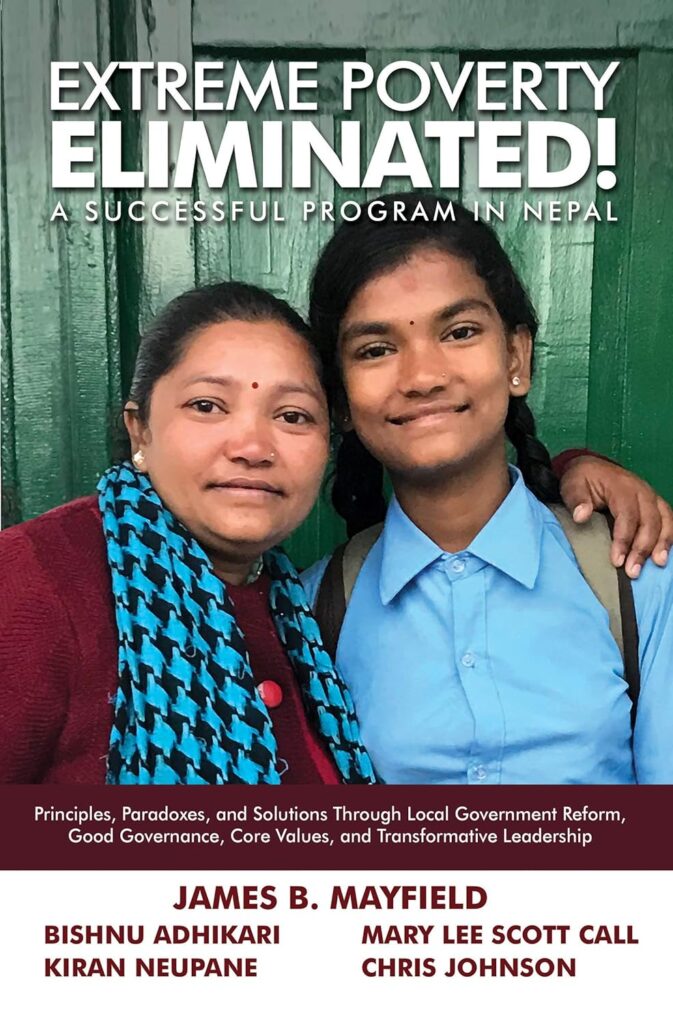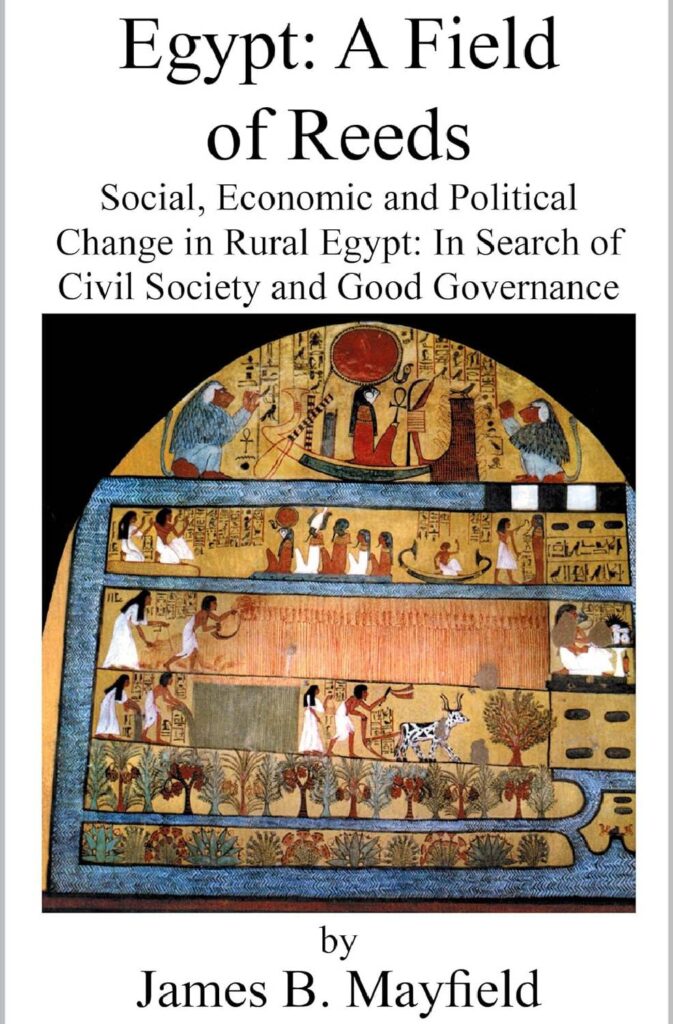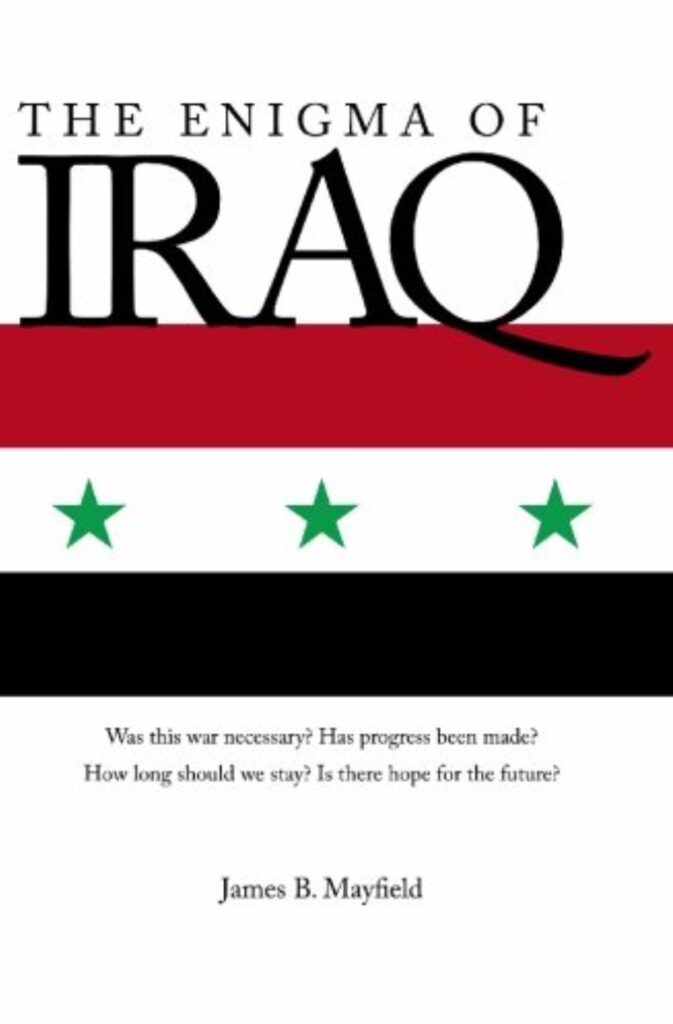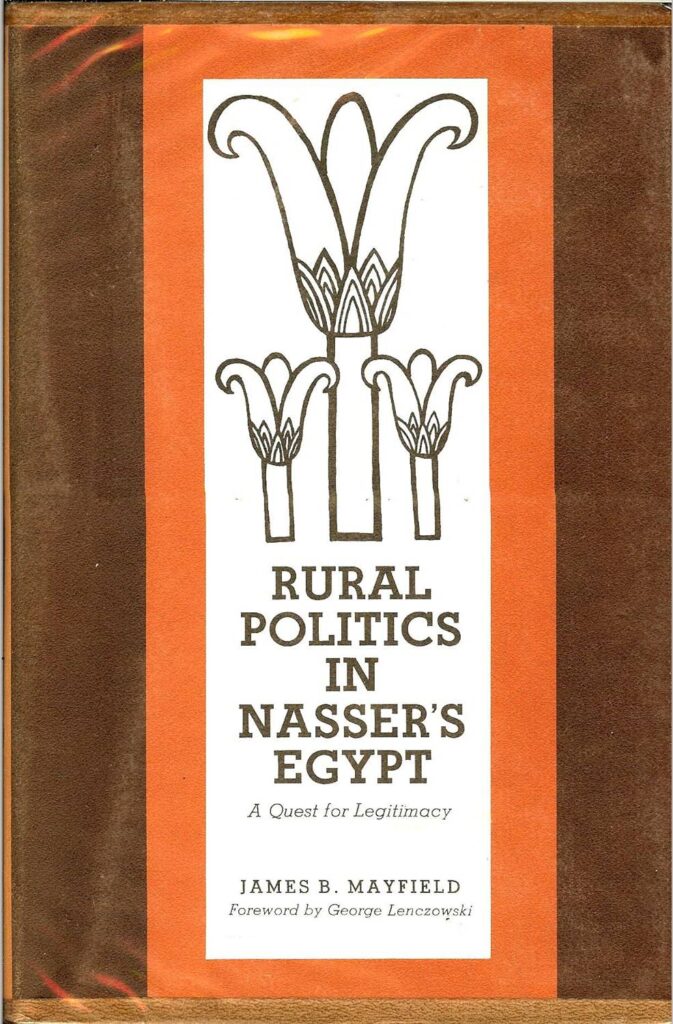BOOK STORE

extreme poverty eliminated! a successful program in nepal
a successful program in nepal
Outlines a set of 12 action steps to bring some 2,000 families living in the Lamjung District of Nepal out of the scourge of extreme poverty in a three-year period. This program integrates six basic principles:
- Institutions based upon principles of good governance,
- Transformative leadership using results-based management,
- Core values and gender equality,
- Self-reliance through leveraging and enterprise development.
- Local government reform through meaningful decentralization
- Extreme poverty elimination though community collaboration and unity.
Radhika Pariyar and her daughter (on the front cover) are living proof that people can bring themselves out of extreme poverty. When Jim Mayfield asked Radhika’s daughter what career she wanted to have when she finished her schooling, she said with great confidence she wanted to become a lawyer and help her people. Tears sprang to Radhika’s eyes when she heard this. When he asked Radhika if she had a dream when she was her daughter’s age, she replied: “I had no dream!” Today Radhika, a woman from the Dalit caste (poorest of the poor), is a successful business woman and has been elected to her local ward council.

Local Government In Egypt
Structure, Process and the Challenges of Reform
James B. Mayfield has been a close observer of Egyptian local government for more than five decades. During this time he has come to know intimately the institutions and processes of government at the subnational level. As his excellent book reveals, local government in Egypt is not immutable. The orthodox notion that Egypt is a hydraulic society, in which all local governmental undertakings are directed from the capital, ignores temporal and regional variations in the degree of autonomy of local government. Among its many contributions, this book documents these variations and links them to their political origins. The quintessential thesis of this book is that local government institutions have an important role to play in reconciling the four dilemmas presented above. While others have tended to argue that the processes of reform and change in Egypt must begin at the macro level through the processes of central government structures, I am arguing that a strengthened local government system may not only be a useful mechanism for confronting these issues, but in fact may be crucial.

One Can Make A Difference
The Challenges and Opportunities of Dealing with World Poverty
In an age when centralized bureaucracies, large-scale donor agencies, and well funded Non Government Organizations (NGOs) seem to dominate the process of development, it is appropriate to reflect on the hundreds, perhaps thousands, of individuals who have dedicated their lives to living and working among the poorest of the poor, those nearly two billion who often live in the more isolated and disadvantaged villages of the world. Professor James B. Mayfield has sought to outline the processes of rural development, seeking to emphasize the various programs, strategies and interventions that have been successful in confronting the tragedies of world poverty.

Egypt: A Field of Reeds
Social, Economic and Political Change in Rural Egypt: In Search of Civil Society and Good Governance
Egypt: A Field of Reeds, covers the history of rural Egypt form the pharaonic period to the modern period. The book presents a detailed account of the public sector (governmental programs), the private sector, agricultural and non-agricultural development, and the social sector (in search of civil society and good governance). It provides a detailed set of policy recommendations to improve the local government system, education, and health care and the process of eliminating extreme poverty. This book opens a dialogue as to how Islam and democracy can be compatible.

The Enigma Of IRAQ
Was this war necessary? Has progress been made? How long should we stay? Is there hope for the future?
This book will seek to answer four questions: Was the war necessary? Has progress been made? How long should we stay?And is there hope for the future? It will provide you with a broader sense of the history, religion, and culture, that one needs to understand the people of Iraq, but also, a much more optimistic view of what the future might hold for these people, than you generally read in the press or hear through the televison.

Rural Politics in nasser's egypt
A Quest for Legitimacy
This book describes in great detail Nasser’s effort to implement a new system of local government. In this book the author presents a series of solution to the political, economic, and cultural challenges facing Egypt today.

Go to the People
This book describes the work of James Yen, who help some 50,000 people to learned read and write.
This program has three stages;
- Mobilization of local leadership.
- Technology transfer and problem solving
- Local institution building
Endorsements for Extreme Poverty Eliminated

Extreme Poverty Eliminated! is a truly original addition to the literature on poverty elimination, not settling for poverty reduction. It shows how an authentic bottom-up approach, mobilizing not just local resources, but also local talents, local leadership and local values, can be transformative, quickly and at low cost. The CHOICE approach of integrated rural development from below shows why integrated rural development programs from above were such costly failures. The book shows that the poor we need not always have with us. They can become productive, even leading members of their communities to the benefit of everyone. By activating and promoting an active sense of solidarity, the CHOICE model puts solidarity, a potent social elixir, into development initiatives. The methods and impacts reported are not unique, which should give us more confidence in them. Their combination and sequencing is a key part of the strategy, and this is worth studying and adapting to many, many circumstances.
DR. NORMAN UPHOFF
Professor Emeritus, Cornell University

This book will make history. Dr. Mayfield’s conviction that poverty can be eliminated is powerful and contagious. Extreme Poverty Eliminated! provides a compelling account of how communities that create an enabling environment allow families to overcome their deprivations. Mutual cooperation that promotes economic self-reliance and solidarity are key elements in Dr. Mayfield’s approach. I highly recommend this book to anyone who wants to make poverty a pest of the past.
DR. MARTIN BURT
Fundacion Paraguaya, Poverty Stoplight

Extreme Poverty Eliminated! is an extraordinary look into the evolution of the thinking of Dr. James Mayfield over an energetic 50-year career dedicated to alleviating the plight of the world’s poorest people. Jim and his co-authors have pretty much seen it all, from early top-down approaches of governments and development agencies to bottom up, grass-roots initiatives. The book is the story of the organization Jim co-founded, CHOICE Humanitarian, illustrated by its work with the impressive Nepal Self- Developing District Program. The latter is presented as a mid-level initiative that embodies key principles for elimination of extreme poverty, such as good governance, leadership development, core values, self-reliance, meaningful decentralization, and unity through collaboration. I highly recommend the book not just for those interested in Nepal, but for all readers curious about how the world’s 800 million poorest people live and what can be done in a very practical way to help people help themselves.
DR. HOLGER KRAY
Practice Manager, Agriculture & Food Security, The World Bank
